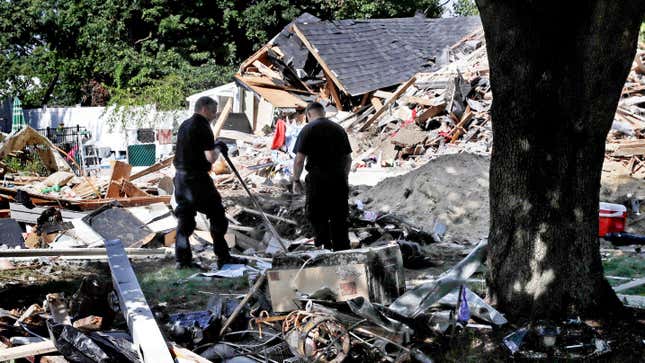
Leaks from the pipelines that supply gas to your home and stove are happening more often than you may think—with deadly consequences. A new report from a group of environmental nonprofits finds that, over the past decade, there were around 2,600 reported cases of methane leaks in the U.S. gas pipeline system, adding up to roughly one every 40 hours.
The data is collected from reports made from 2010 to 2021 to the U.S. Department of Transportation, Pipeline and Hazardous Materials Safety Administration, or PHMSA, which regulates the system of pipelines that bring natural gas to heat homes and buildings and power gas appliances. Leaks can be accidental, caused by an equipment failure or rupture, but utilities will also intentionally release gas from pipelines to relieve pressure on the system—which can unintentionally cause accidents.
“These figures only include the most serious events,” Matt Casale, the Education Fund Environment Campaigns Director at U.S. PIRG and one of the coauthors of the report, said in an email. He explained that PHMSA requires reporting only when some serious criteria are met, including when someone dies or is hospitalized, when property damage from an explosion exceeds $122,000 or more; and when there’s a significant amount of gas lost in the leak.
Just a few thousand serious incidents over a period of more than 10 years may not seem like a lot. But pipeline leaks can be deadly, catastrophic events, destroying entire homes and neighborhood blocks if they lead to an explosion. An explosion caused by a terminal failure in 2010 in California, for instance, killed eight people; the explosion was on par with the effect of a 1.1 magnitude earthquake. As recently as this March, a plumber accidentally cut a gas line in the basement of a four-story apartment building, and the resulting explosion destroyed the building and hospitalized 14 people while leaving hundreds of residents displaced. All told, those 2,600 incidents logged in reports to PHMSA resulted in 328 explosions, which killed 122 people and injured more than 600.
Perhaps unsurprisingly, most of these incidents occurred in fossil-fuel-happy and regulation-hatin’ Texas. The state saw 287 leaks that had to be reported to the federal government; more than 100 of those resulted in either a fire or an explosion, while 14 people died and 58 were injured. Those accidents were costly, too: Communities paid more than $116 million to clean up after these gas-related incidents.
The government doesn’t collect reports on gas explosions or incidents that happen from leaks in gas stoves or other appliances. “There are certainly many smaller leaks or leaks at the extraction and production levels that don’t meet these reporting requirements, so it’s an undercount of total leaks in the pipeline system,” Casale said.
And some of the leaks not counted in the data can still have deadly impacts. “There are some serious gas explosions that have caused death or injury that are not included in the data as they did not occur in the pipeline system (i.e., explosions in people’s home from leaks in gas stoves or other gas appliances),” Casale explained.
Even when it doesn’t result in an explosion or death, gas infrastructure is taking a huge toll on the climate. The methane leaking from gas pipes is eight times more potent in the atmosphere than carbon dioxide; scientists agree that we seriously need to curb methane emissions in order to halt intense short-term warming. A 2018 study found that methane leaks from natural gas pipelines and oil and gas facilities put the short-term impact of warming from natural gas on par with CO2 emissions from coal plants. Those Texas accidents alone released the equivalent emissions of more than 53,000 gas-powered cars driven over a year, the report finds.
“House explosions and leaking pipelines aren’t isolated incidents—they’re the result of an energy system that pipes dangerous, explosive gas across the country and through our neighborhoods,” Casale said. “It’s time to move away from gas in this country and toward safer, cleaner electrification and renewable energy. Where we use gas, it leaks. And where it leaks, it poses significant health, safety and environmental risks.”